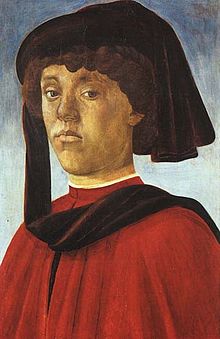Lorenzo il Popolano
| Lorenzo di Pierfrancesco de' Medici | |
|---|---|

Portrait, possibly of Lorenzo, by Sandro Botticelli
|
|
| Born | 4 August 1463 Florence, Republic of Florence |
| Died | 20 May 1503 (aged 39) Florence, Republic of Florence |
| Noble family | Medici |
| Spouse(s) | Semiramide Appiano |
|
Issue
Pierfrancesco the Younger
Averardo de' Medici Laudomia de' Medici Ginevra de' Medici Vincenzo de' Medici |
|
| Father | Pierfrancesco the Elder |
| Mother | Laudomia Acciaioli |
Lorenzo di Pierfrancesco de' Medici (4 August 1463 – 20 May 1503), nicknamed the Popolano, was an Italian banker and politician, and the brother of Giovanni il Popolano. He belonged to the junior (or "Popolani") branch of the House of Medici of Florence.
Lorenzo was born in Florence, the son of Pierfrancesco de' Medici (the Elder) and Laudomia Acciaioli. Relations between the senior Medici branch and the younger "Popolani" branch had been tense since the 1440s, and Pierfrancesco had tried to shield his sons from the influence of the senior branch. But Lorenzo and Giovanni were still boys when their father Pierfrancesco died in 1476, and they promptly came under the tutelage of their older cousin, Lorenzo (il Magnifico), the effective ruler of Florence. Facing financial difficulties after 1478, Lorenzo il Magnifico plundered the Popolani boys' inheritance with "forced loans". By the time they came of age, they claimed Lorenzo il Magnifico owed them over 100,000 ducats (Il Magnifico eventually repaid a little over half of that in 1485).
Nonetheless, Lorenzo il Magnifico ensured his ward obtained the best education that could be bought at the time. Lorenzo di Pierfrancesco studied under notable Florentine Renaissance humanists Marsilio Ficino, Angelo Poliziano and Giorgio Antonio Vespucci (uncle of the navigator Amerigo Vespucci; Amerigo was a fellow-student and, from the 1483, became an employee and friend of Lorenzo di Pierfrancesco; in the early 1500s, Amerigo Vespucci would send most of his famous letters on the "New World" to Lorenzo di Pierfrancesco). Lorenzo di Pierfrancesco emerged with the reputation as a man of liberal views, a poet and art connoisseur in his own right. In ca. 1485, he commissioned an illuminated manuscript of Dante's Divine Comedy featuring artwork by Botticelli.
...
Wikipedia
